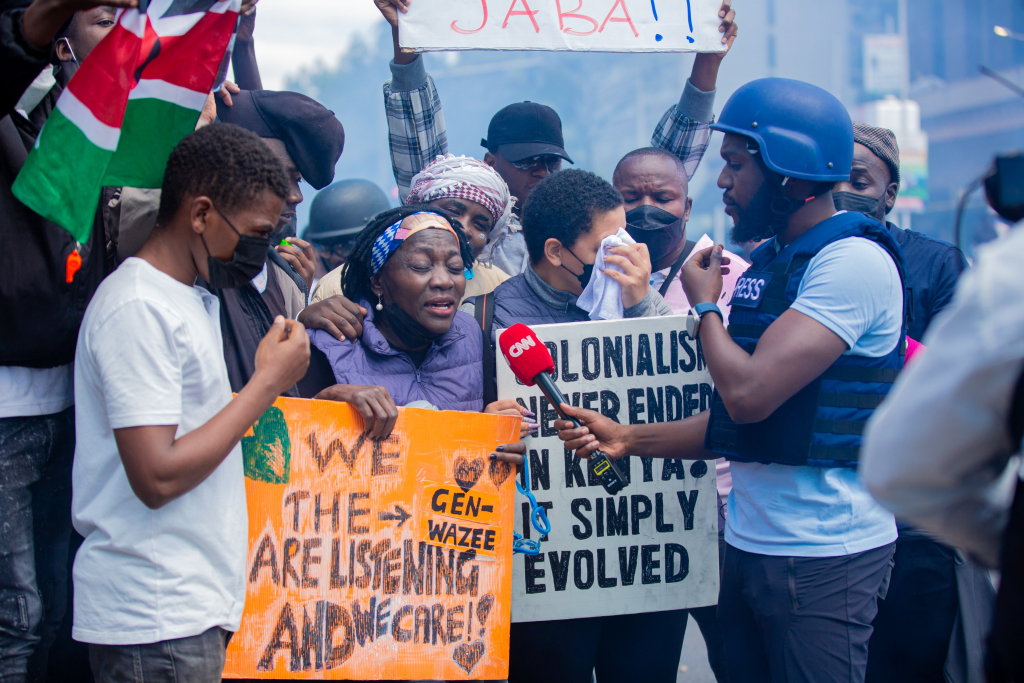The Long Series on Africa: A new breed of protest has left Kenya’s president tottering
29, 6, 2024
147

Sources: The Economist
28 June, 2024 Edition
=================
Though kenya’s equilibrium is occasionally punctured by bouts of political unrest, the country is generally seen as fairly stable, prosperous and liberal. Such cosy assumptions, however, were rudely jolted by tax riots, which reached a deadly peak on June 25th. Overwhelming the police in Nairobi, the capital, protesters broke into Parliament, set fire to a section of it, pinched the mace and forced terrified mps to flee. The security forces responded with live fire, killing at least 23 people.
Kenya now stands in uncharted territory. Not only was Parliament overrun, protests also erupted in at least 35 of the 47 counties, including in the highland heartlands of William Ruto, its suddenly embattled president. Even more startling than the widespread nature of the protests were the attacks on offices of Kenyan mps and local government officials seen as aligned with Mr Ruto’s tax policies. Rarely has hatred for the political class felt so acute.
The most pertinent rupture with the past, however, is the nature of the protest movement itself, which has the whiff of revolution. These protests are the first in Kenya with more of a class tinge than an ethnic one. The movement behind them has been driven by youngsters who wear their Gen Z identity with pride and who have spread their message through TikTok videos and social-media memes. “We are not our parents,” many say.
Ostensibly leaderless, they have distanced themselves from all politicians. “The protests aren’t being led or directed by political leaders,” says John-Allan Namu, a Kenyan journalist. At the movement’s core is Kenya’s small middle class, but it has found wider appeal. Many of those who joined the protests were poor slum dwellers like Kelvin Ondiek. “This is a new kind of protest,” he said as he sheltered from the tear gas. “This time we might actually make a difference.”
Confronted with a new threat, Mr Ruto, normally a deft strategist, has repeatedly blundered, underestimating the scale and nature of the opposition ranged against him and then miscalculating his response. The president’s first misjudgment arose from the belief that alienating Kenya’s small middle class would carry few tangible consequences. After inheriting a debt-ridden country in 2022 from his predecessor, Uhuru Kenyatta, and having campaigned on a populist pro-poor platform, he was left with no choice but to raise taxes to avoid defaulting. Tax rises also allowed the president to pay for poverty-alleviation schemes, including fertiliser subsidies and low-cost housing.
Alienating the 17% of workers in formal jobs may have seemed a small price to pay for winning the support of Kenya’s vastly bigger huddled masses. The likelihood of them taking to the streets seemed small. They were merely “cool kids”, scoffed David Ndii, Mr Ruto’s chief economic adviser.
But enraged by another round of tax increases in the budget for 2024, unveiled earlier this month, the keyboard warriors began to show real fight. As the protests swelled, government complacency gave way to panic. Some drew comparisons with Egypt’s uprising of 2011, which was similarly spearheaded by an underestimated middle class and driven by social media.
Many of Mr Ruto’s responses seemed to mirror those of Hosni Mubarak, the Egyptian president toppled by the Tahrir Square uprising. On the one hand he sought to placate the protesters by offering desperate concessions that did little more than further enrage the public. On the other, he responded with draconian force. Prominent social activists disappeared in the hours before the protests of June 25th began. Later, as order disintegrated, Mr Ruto ordered the army to mobilise and vowed to crush the “treasonous” protesters. On June 26th he appeared to capitulate entirely, withdrawing the hated finance bill.
Yet a movement that started by opposing taxes is now demanding the resignation of Mr Ruto himself. Enraged by so many deaths and sensing weakness on the president’s part, protesters may seek to press home their advantage. Even if Mr Ruto survives, he will be severely weakened. A president forced to veto his own budget can hardly be otherwise.
Powered by Froala Editor

